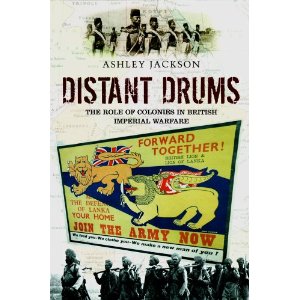Bermuda’s Vital Military Role Explored
 Bermuda’s vital role as a fortress colony in 20th century British military planning along with the transformative impact overseas service had on both the island’s soldiers and Bermudian society as a whole during World War One (1914-18) and World War Two (1939-1945) are topics explored in a recently published book.
Bermuda’s vital role as a fortress colony in 20th century British military planning along with the transformative impact overseas service had on both the island’s soldiers and Bermudian society as a whole during World War One (1914-18) and World War Two (1939-1945) are topics explored in a recently published book.
In “Distant Drums: The Role of Colonies in British Imperial Warfare”, historian Dr. Ashley Jackson — a senior lecturer at King’s College, London –reveals how colonies were central to the defence of the British Empire and the command of the oceans that underpinned it.
The book blends sweeping overviews of the nature of imperial defence with grass-roots explanations of how individual colonies like Bermuda — long the headquarters of a Royal Navy force which maintained British seapower in the West Indies – were mobilised for war. He draws on specialist knowledge of the Indian Ocean and colonies such as Bechuanaland, Ceylon, Mauritius, and Swaziland. This permits the full and dramatic range of action involved in imperial warfare – from policy-makers and military planners in Whitehall to chiefs recruiting soldiers in African villages — to be viewed as part of an interconnected whole.
After examining the strategic reasons for acquiring colonies, “Distant Drums” considers the colonial role in the First World War. It then turns to the Second World War, documenting the recruitment of colonial soldiers, their manifold roles in British military formations, and the impact of war upon colonial home fronts. It reveals the problems associated with the use of colonial troops far from home, and the networks used to achieve the mobilisation of a global empire, such as those formed by colonial governors and regional naval commanders.
“Distant Drums” has been called “an important contribution to our understanding of the role of British colonies in twentieth-century warfare”. The defence of empire has traditionally been associated with the military endeavours of Britain and the “white” Dominions of Canada, South Africa, Australia and New Zealand, with the Indian Army sometimes in the background. This book champions the crucial role played by the other parts of the British Empire – the sixty or so colonies spread across the globe – in delivering victory during the world wars of the twentieth century.
In this film, made during the Second World War by the British Ministry of Information, a group of West Indians and Bermudians, led by Una Marson and Learie Constantine, assemble at Broadcasting House in London. They describe to listeners of a popular BBC radio series, “Calling the West Indies”, how people from the Caribbean are supporting the war effort.
The book has received enthusiastic reviews, with Professor Saul David writing in the BBC History Magazine”: “The military history of the colonial empire has been overlooked. Why was this so? Partly, explains Jackson, because the Dominions and India provided the empire with its ‘main non-British defence assets that could be utilised for imperial purposes’.
“The colonies, on the other hand, had no warships or air forces, and their armies were relatively small during peacetime and intended ‘primarily for internal policing’. And when they did make significant military contributions – in both world wars, for example – it was often by the less glamorous provision of essential military labour to support fighting fronts, rather than front-line soldiers.
“… Yet, according to Jackson, colonies have always been central to imperial defence. Many were acquired precisely because of this utility, and ‘small’ wars on the colonial frontier were the ‘meat and drink of the British military for much of the 19th and 20th centuries. The ‘base infrastructure’ of colonies – from fortresses to aerodromes – was essential to the functioning of the British military system, as was their provision of human resources. During the Second World War, the colonies supplied more troops to the imperial cause than all of the ‘white’ Dominions combined, including the 100,000-strong logistical support force that enabled Montgomery’s victorious 8th Army to sweep all before it in north Africa.”
Dr. Jackson has addressed Bermuda’s military history before in his 2006 book “The British Empire and the Second World War.”

